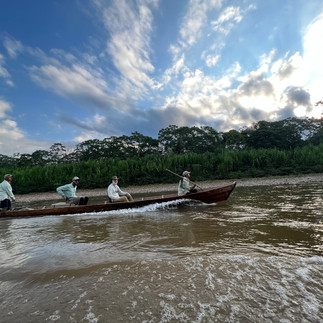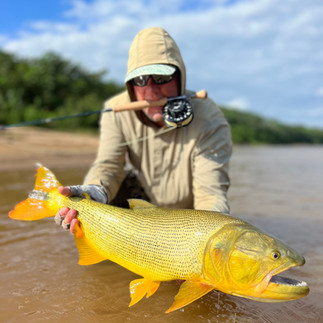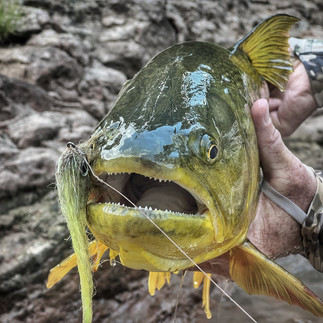Gold in Them Bolivian Hills
- Clark Smyth
- Nov 15, 2023
- 5 min read
Updated: Jun 13, 2024
By Clark Smyth

I'm sure some of us are aware of "The Angling Report", a long-time monthly newsletter dedicated to serve the traveling angler. It seems the publication recently fell victim to the pandemic (if you know otherwise, please let us know). However, for many years it provided information, often anecdotal, on the status of traveling the world with a fishing rod. There was a particularly good segment titled, "the good, the bad, and the ugly" and could serve as fair warning or offer constructive criticism.
We all know that on any given fishing trip, things happen. We never know what or when, but something noteworthy will inevitably happen. This can be related to the uncontrollable aspects of the trip: the weather, the fishing conditions, the wildlife, the people involved, etc. The controllable aspects of the trip: the travel arrangements, the accommodations, the meals, the services provided, etc., are likely more criticized. The following trip report to Bolivia, it turns out, was not merely another fishing trip; it served to accent the relationship between both the controllable and uncontrollable aspects of any destination fishing trip. In the spirit of the Angling Report, I offer my report:
Earlier this summer, a group of eight adventurous anglers embarked on a bucket-list journey to Untamed Angling's flagship Bolivian fishing lodge, Pluma Lodge. Led by Angling Destinations' host Clark Smyth, this small group of seasoned anglers ventured deep into the heart of the Bolivian rainforest for an immersive experience in one of the world's most diverse biomes.
After meeting up in Santa Cruz de la Sierra, Bolivia and a night spent adjusting to the local culture at the well-appointed Marriott Los Tajibos downtown. The following morning, the group hopped on a small charter flight to a jungle airstrip in the small native village of Oromomo. They were welcomed by a few enthusiastic Argentine fishing guides, ready to journey to the lodge. The run upstream from Oromomo involved a more-than-an-hour boat ride on dugout canoes, offering an immediate immersion into the rainforest's embrace. A symphony of birdlife dotted the scene. McCaw gracefully glided over the river channel squawking loudly. Spoonbills, egrets, storks and heron lined the riverbanks. Monkey troops conducted high-pitched choruses from a distance, punctuated by unseen creatures rustling in the underbrush. This was a place where wild reigned supreme, and humanity its humble guest.
Pluma Lodge, remarkably comfortable and well-equipped given its remote location, is a testament to logistical ingenuity. Constructed with jungle-wood and thatching, it overlooks the Pluma River. The lodge boasts highly comfortable rooms, each with ensuite bathroom - including hot water, a lounge with a stocked bar, dining room, fly shop, and various facilities, all interconnected with the surrounding natural environment.
The meals, a mix of Bolivian and Argentine fare, exceeded expectations, complementing the clean and comfortable accommodations. The presence of wildlife, even sometimes within the rooms, added to the rustic charm of the experience. There were a few instances of frogs, mice and bats found clamoring around inside the rooms, and jokingly the group decided that the mosquito nets hung may have been intended to keep these other creatures out of guest's beds, not the mosquitos as they were noticeably rare compared to other biting insects (no-see-um's).
The main attraction, however, was the golden dorado, a majestic fish that reigns supreme in central South American waters. Known for its fierce nature, striking appearance, and lightning fast reflexes, it's no wonder dorado are a coveted game-fish to pursue on the fly. On this short 6-day stint, the fish assuredly tested the skills and resolve of every angler. Add the jungle dynamic with its intense heat and humidity, sometimes miles-long hikes through the backcountry, and overall ruthlessness, this group each agreed that this experience offers some of the most grueling fly-fishing available.
Despite a serious deluge in the mountains on the third night, bringing the rivers up by 25% overnight and blowing out the entire system, and therefore essentially eliminating a day of "fishy" conditions, everyone in the group caught multiple fish on this trip. Per usual, some days and some beats offered better opportunities. But, overall the group was pleasantly surprised by the fishing - particularly if we chose to apply some grit and a little tenacity to the cause. Notably, the Itirizama River, accessible only via Pluma Lodge, offered a surreal experience where fish measured in pounds were hunted with eyes first, their golden scales flashing in the sunlit clear waters. The thrill of sight-fishing for these fierce fighters in a remote corner of South America's Amazon Rainforest in crystal-clear streams was an unparalleled experience, elevating the sense of adventure to something seemingly imaginary. Beyond the dorado, the biodiversity of the waters, from pacu to yatorana and various catfish species, added depth to the fishing experience as well as a handfull of memorable captures.
The early part of the dorado season provided this group with prime fishing conditions. However, there was an underlying wonderment about the impact of fishing pressure on the fishery, as Untamed Angling's three lodges with, albeit rare but sometimes overlapping beats, often fished by capable anglers, may be diminishing the experience for groups that visit late in the season. However, the dorado are indeed migratory and new fish do certainly enter the system. Who knows, perhaps it's the driving force behind their helicopter fly-out program?
Notwithstanding the highlights, which were certainly innumerable, the lodge's operational dynamics did cast an unfortunate shadow over the experience. The management's focus seemed skewed towards their helicopter program, overshadowing the traditional fishing experience. This created a noticeable divide and, coupled with a few other peculiarities involving the staff/management relationship and the unusual presence of video surveillance in spaces like the dining room and just outside guest quarters did seem quite odd.
Aside from the natural splendors, fishing triumphs, and a couple of managerial abnormalities, the interaction with the native Tsimane (and other tribes) people stood out. Their intimate knowledge of the jungle and their involvement in the lodge's operations enriched the experience (each group of two anglers has two native villagers and one Argentine fishing guide assigned to their boat). The native's intimate knowledge of the jungle's secrets were evident in every action and interaction. They moved through the forest, barefoot, with an ease that spoke of centuries of ancestral knowledge. They crossed the river with a Stevie Nicks-like flow through the water, again in bare feet! They hunted (with primitive bow and arrow) and were very effective whether they were hunting sabaló (the natural migrating baitfish preferred by both the golden dorado and the native people) or if hunting larger mammals mimicking the stealth of a Jaguar. Despite the language barrier, they were often eager to share their profound connection with the environment truly blending ancient wisdom with modern adventure.

Pluma Lodge's unique position, with access to the clear-water tributaries of the Bolivian Amazon, and its more exclusive (and expensive) helicopter excursions, sets it apart from other lodges. Including its sibling lodges in the vicinity which each have their charm and specific fishing opportunities and are very-much a wonderfully similar experience and also well worth a visit. Undoubtedly, the trio of Tsimane lodges run the gamut on access to some of the best and unique golden dorado anywhere in South America.
The journey to Pluma Lodge spotlighted the many aspects that need to come together to make a "successful" destination fishing trip. The uncontrollable aspects happen as they happen; from the breathtaking beauty of the rainforest and the exhilarating dorado fishing to the enriching cultural exchanges with the native people and the friendships forged with the Argentine guide-crew. The controllable aspects, of which the vast majority were orchestrated flawlessly, were lamentably overshadowed by a few complexities of lodge management. The hope remains that the lodge will address its operational challenges, allowing future guests to immerse fully in the unparalleled adventure and natural wonder that Pluma Lodge and its surroundings have to offer. At the end of the day, this group had a highly memorable experience filled with awe and reflection and would likely recommend the experience with very limited reservation.








































Comentários